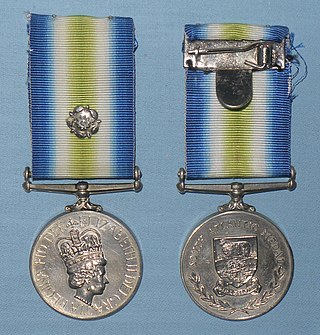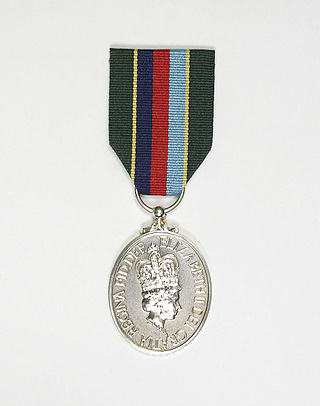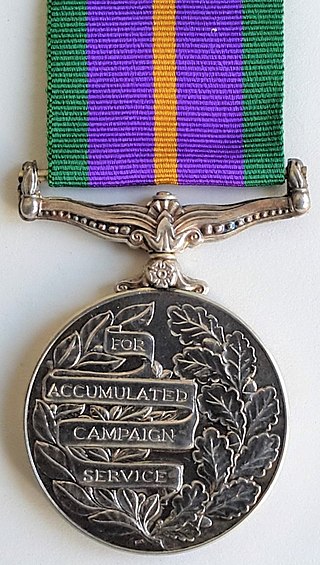
Operation Barras was a British Army operation that took place in Sierra Leone on 10 September 2000, during the late stages of the nation's civil war. The operation aimed to release five British soldiers of the Royal Irish Regiment and their Sierra Leone Army (SLA) liaison officer, who were being held by a militia group known as the "West Side Boys". The soldiers were part of a patrol that was returning from a visit to Jordanian peacekeepers attached to the United Nations Mission in Sierra Leone (UNAMSIL) at Masiaka on 25 August 2000 when they turned off the main road and down a track towards the village of Magbeni. There the patrol of twelve men was overwhelmed by a large number of heavily armed rebels, taken prisoner, and transported to Gberi Bana on the opposite side of Rokel Creek.
An international decoration is a military award which is not bestowed by a particular country, but rather by an international organization such as the United Nations or NATO. Such awards are normally issued as service medals, for participation in various international military operations, and not for specific acts of heroism or bravery.
The NATO Medal is an international military decoration which is awarded to various militaries of the world under the authority of the North Atlantic Treaty Organization (NATO). It is manufactured by Eekelers-Centini Intl, of Hemiksem, Belgium.

The King's Commendation for Bravery and the King's Commendation for Bravery in the Air are United Kingdom awards, open to both military personnel and civilians. They were established in 1994, when the award of the Queen's Commendation for Brave Conduct and the Queen's Commendation for Valuable Service in the Air were discontinued.

The Gulf War Medal was a campaign medal approved in 1992, for issue to officers and men of British forces who served in Kuwait and Saudi Arabia during Operation Granby in 1990–91.

The Iraq Medal was authorised on 23 February 2004. It was a campaign medal issued to members of the British Armed Forces and certain attached personnel, who served between 20 January 2003 and 22 May 2011 on, or in support of, Operation Telic - the designation for British operations during the 2003 Invasion of Iraq and its aftermath.

The Operational Service Medal (OSM) is the overall name given to a group of campaign medals awarded by the British armed forces. Introduced in 1999 to replace the General Service Medal, the OSM features a common design for the medal itself, with each one differentiated by a distinct ribbon.

The Operational Service Medal for Afghanistan is a campaign medal previously awarded by the Ministry of Defence of the United Kingdom for service by British Armed Forces personnel in support of the post-2001 Afghan War.

The Operational Service Medal for the Democratic Republic of the Congo is a British armed forces campaign medal, awarded mostly to military personnel who served between 14 June and 10 September 2003 on Operation Coral.

The South Atlantic Medal is a British campaign medal awarded to British military personnel and civilians for service in the Falklands War of 1982 between the United Kingdom and Argentina. Over 33,000 medals have been awarded. The South Atlantic Medal Association was formed in 1997 for recipients of the South Atlantic Medal.

The General Service Medal, is a campaign medal of the United Kingdom introduced in 1962 to replace both the General Service Medal (1918), as awarded to the Army and RAF, and the Naval General Service Medal (1915). The 1962 GSM was awarded until 2007, when it was replaced by the Operational Service Medal. In 2015 the General Service Medal (2008) was introduced.

The Volunteer Reserves Service Medal (VRSM) is a medal which may be awarded to members of the Volunteer Reserves of all branches of the British Armed Forces - the Royal Naval Reserve, the Royal Marines Reserve, the Army Reserve and the Royal Auxiliary Air Force. It replaced the separate decorations and medals awarded respectively to officers and other ranks in each of the services - the Royal Navy's Reserve Decoration and Reserve Long Service and Good Conduct Medal, the British Army's Territorial Decoration and Efficiency Medal, and the Royal Air Force's Air Efficiency Award - from 1 April 1999.

The King's Commendation for Valuable Service is a British military award for meritorious service in an operational theatre. It was established in 1994, when the award of the Queen's Commendation for Brave Conduct and the Queen's Commendation for Valuable Service in the Air were discontinued.

The Accumulated Campaign Service Medal and the Accumulated Campaign Service Medal 2011 are medals awarded by King Charles III to members of his Armed Forces to recognise long campaign service. The original Accumulated Campaign Service Medal, instituted in January 1994, was awarded to holders of the General Service Medal (1962) who had completed 36 months of accumulated campaign service. The replacement Accumulated Campaign Service Medal 2011 is now currently awarded to holders of various campaign service medals who have completed 720 days of campaign service.

The Iraq Reconstruction Service Medal was a British service medal distributed by the Foreign and Commonwealth Office. It was awarded to civilian public servants, contractors and consultants, and to members of the Armed Forces working with British Government Departments, who were either appointed, deployed or employed by Her Majesty's Government (HMG) to work in Iraq, and who had served at least 40 days.

The Civilian Service Medal (Afghanistan) is awarded by the British government to civilians (and members of the UK Armed Forces in certain non-combat roles) to recognise service since 19 November 2001 in the transition to democracy in Afghanistan.
The United Kingdom began a military intervention in Sierra Leone on 7 May 2000 under the codename Operation Palliser. Although small numbers of British personnel had been deployed previously, Palliser was the first large-scale intervention by British forces in the Sierra Leone Civil War. In early May 2000, the Revolutionary United Front (RUF)—one of the main parties to the civil war—advanced on the country's capital, Freetown, prompting the British government to dispatch an "Operational Reconnaissance and Liaison Team" (ORLT) to prepare to evacuate foreign citizens. On 6 May, the RUF blocked the road connecting Freetown to the country's main airport, Lungi. The next day, British soldiers began to secure the airport and other areas essential to an evacuation. The majority of those who wished to leave were evacuated within the first two days of the operation, but many chose to stay following the arrival of British forces.

The Ebola Medal for Service in West Africa, known simply as the Ebola Medal, is a service medal for issue to the Armed Forces and to civilians, working either for Her Majesty's Government or for non-governmental organisations, in support of the British Government's response to the Ebola crisis in West Africa between March 2014 and March 2016. The medal is the first to be awarded by the UK Government for a humanitarian crisis response.

The Operational Service Medal Iraq and Syria or Operation Shader Medal is a British armed forces campaign medal, awarded mostly to military personnel who served in the operational area of, or in support of Operation Shader. The medal was first announced by former Defence Secretary, Sir Michael Fallon on 19 September 2017. It was first awarded, to service personnel, on 18 July 2018 in London by Defence Secretary Gavin Williamson. This Operational Service Medal is the first medal of the contemporary era to be awarded to individuals who served outside of the operational area, reflecting the changing nature of warfare.

















